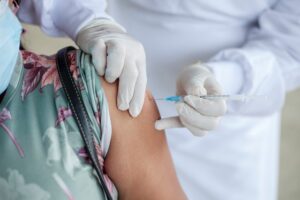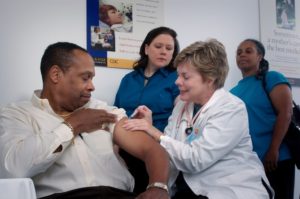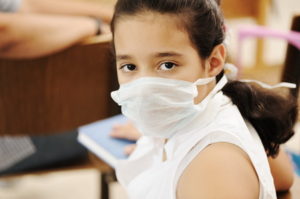
If you have been watching the news, the conclusions that our scientists have been making are changing faster than with every passing day, not to mention the controversies that surround every conclusion. Wear masks! Don’t wear masks! Get a vaccination! Don’t get one! Children are getting sick from the vaccine. No, they aren’t. And the feuding goes on. With all this controversy and confusion, let’s stick to one subject for this article:
Should High-Risk People Get a Booster Shot?
A booster shot is a third injection (second for the Johnson & Johnson vaccine) that is said to help increase your immunity from the covid virus, including the latest Delta variant. Many people have been questioning this though. Some are saying it is nonsense while others question what should be the final verdict that will help keep these individuals protected? Unfortunately, we do not know this yet, but from what we do know, we can make some educated guesses.
Before we delve further into this article, we would strongly advise all our readers to get vaccinated against COVID-19 as soon as possible, unless you have been told by your doctor to wait. Moreover, ensure that your loved ones, friends, and family members get the vaccine. Not only does this help protect each individual, but it also protects those with cancer and other immunocompromised individuals who are vulnerable to the disease.
Do Immunocompromised Individuals Benefit from the COVID Vaccine?
 The problem is that Individuals who suffer from blood cancer, such as leukemia, lymphoma, or multiple myeloma may find that the COVID-19 vaccine leads to a lowered immune response. However, this is the norm for all vaccines when it comes to these individuals. However, immunocompromised individuals are strongly recommended to get the vaccine as it still provides them with some sort of protection.
The problem is that Individuals who suffer from blood cancer, such as leukemia, lymphoma, or multiple myeloma may find that the COVID-19 vaccine leads to a lowered immune response. However, this is the norm for all vaccines when it comes to these individuals. However, immunocompromised individuals are strongly recommended to get the vaccine as it still provides them with some sort of protection.
Those who are getting treatment, such as chemotherapy or radiation for other types of cancers, can also face some form of a compromised immune system. As of now, there is not enough evidence to conclude whether these immunocompromised individuals and COVID vaccines have any connection and whether the effectiveness of the vaccine will be lower for them.
However, doctors have urged everyone to get vaccinated. This is mainly because exposure from unvaccinated individuals can also majorly harm immunocompromised patients.
Is a Booster Shot Necessary for Immune Compromised Individuals?
Even though several laboratory studies have pointed to the fact that high-risk individuals may require a booster dose of the vaccine, more research is needed. As of now, case studies are being conducted on individuals who have received both doses of either Pfizer or Moderna, or one dose of Johnson and Johnson. These individuals were given a booster shot two weeks after their last shot.
The CDC advisory committee had a meeting on July 22, 2021, to figure out whether immunocompromised individuals and COVID vaccine boosters had any connection and if the booster could increase the protection of the individual. Even though lots of evidence points towards the fact that a third dose of the vaccination could increase protection, no government agency or medical organization has recommended patients to get this yet.
Is it Okay for Transplant Patients to Get their Antibodies Tested?
According to the CDC, antibody testing is not recommended across the board. This is because those who have normal immune systems will show a great response, mainly because most vaccines are known to be 95 percent effective.
There is no harm if a transplant patient wants to get an antibody test. However, it must be kept in mind that a test provides data, but it does not contain all the information.
If you have recently gotten a transplant and have already been given both doses of the COVID-19 vaccine, we would recommend waiting a month before getting an antibody test. If the test comes out to be negative, it shows that you do not have great immunity. However, even if the test comes out to be positive, this does not mean that you can give up on being careful. As a transplant patient, you must be careful until there is further research on the subject.
One of the biggest confusions with positive antibody tests is that the term “positive” can entail a number of things. Medical experts will not be able to judge if a patient has an intact T-cell response, even if their test results are good. Moreover, T-cell inhibitors are common with transplant patients since this causes acute rejection in the patient’s organs.
How Immune Compromised Individuals Can Protect Themselves from COVID

The best way for immunocompromised patients to protect themselves from COVID-19 is to avoid going into huge crowds. Moreover, they should not attend any indoor public events that contains unvaccinated individuals. In case everyone is vaccinated, they should all be masked for an immunocompromised patient to attend. We would urge that all unnecessary travel is stopped, including out-of-country travel. This is mainly because new variants keep springing up, and the infection rates are climbing by the day.
In case you have not already done so, urge those around you, your loved ones, friends, and family members to get the vaccine for your protection and theirs. There is a huge magnitude of research that shows that the vaccine is completely safe. Most people do not have any side effects, and even if they do, the side effects are minuscule, just like they would be for any other vaccine. Additionally, those who are vaccinated are less likely to get severe symptoms from the Delta variant.
Conclusion
It is our belief that everyone over the age of 15 should get the COVID-19 vaccination. The disease does not discriminate, meaning that everyone is at risk. If you have loved ones in the hospital who are immunocompromised, have cancer, or have recently gotten a transplant, you should make it your responsibility to be careful when around them!
